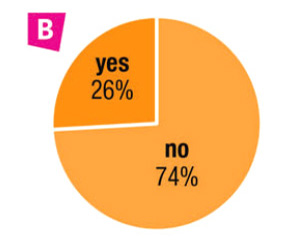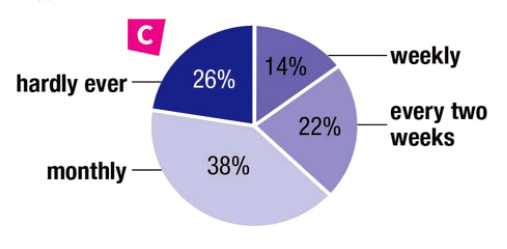Exercise 1
1. Match the words in the box to the meanings.
|
anxious annoying sensitive silly reliable sensible thoughtful easygoing jealous sociable talented loyal |
1 making you feel angry
2 someone you can trust and/or believe
3 behaving in a careful way that shows good judgment
4 enjoying being with people
5 worried and nervous
6 relaxed and calm
7 behaving in a way that is funny and not serious
8 having a natural ability to do something
9 always supporting and liking someone
10 thinking about how you can help other people
11 wanting something that someone else has
12 being easily upset by things other people say or do to you
2. Listen to Sophie and Ben talking about the quiz. Which of the adjectives from 1 would you use to describe them?
Answer & Audioscript
1
1 annoying 2 reliable 3 sensible 4 sociable
5 anxious 6 easygoing 7 silly 8 talented
9 loyal 10 thoughtful 11 jealous 12 sensitive
2
Sophie: sociable, reliable and honest
Ben: reliable and thoughtful
Audioscript
Sophie: Hey Ben, look, here’s a quiz about the kind of friend you are. Do you want to do it?
Ben: OK.
Sophie: Let’s see what kind of a friend we are! So we look at the sentences and choose the ones that are most true for us. Oh look! Here’s one for you. ‘I’d do anything to help my best friends.’
Ben: You think so? That’s a nice thing to say. Thanks, Sophie!
Sophie: Well it’s true! You are thoughtful and you always listen to people, especially us girls and our problems! And you know how to keep a secret, so we all trust you with our secrets.
Ben: Yes, that’s true. OK, well here’s one that’s true for you, Sophie: ‘I love hanging out with a big group of friends.’ I mean, that’s because everyone loves you. You’re a fun girl!
Sophie: Thanks, and I do love my friends. This one is also true for me: ‘I have lots of best friends – girls and boys.’ You know I’m not the kind of person who only has one or two best friends. I have loads, really!
Ben: Well, that’s because you’re reliable and honest!
Sophie: Aw! Thanks, Ben!
Ben: If you say you’ll do something, then you do it. That’s the kind of person you are. I like that. I think that’s a great personal quality. Oh, now here’s one that definitely isn’t you. ‘I prefer to listen to other people’s ideas.’ Haha! Er, no!
Sophie: Well, I can’t be perfect! I just have loads to say! Mind you, like you, I don’t mind listening to other people’s problems. Do you agree?
Ben: Yes, I do actually, and I guess the one thing here that isn’t true for either you or me is this one about feeling anxious.
Sophie: Hmm no, I don’t feel that, but there are plenty of people who do. OK, er, and this is also true for me: ‘I love my friends but I really love being on my own,’ you know, doing my own things.
Ben: OK, well, is that it? Can we see now? I want to know what kind of friend we are.
Sophie: Let’s see. If we just go to page …
Exercise 2
1. Listen and complete the notes. For each question, write the correct answer in the gap. Write one or two words or a number or a date or a time.
Notes for WRITING A QUIZ
The name of the quiz is ‘(1)……………’.
The quiz should not just include questions about (2)…………… such as people’s interests.
Write ten questions using a different (3)…………… each time.
Write options for people to select, which show whether a person is (4)…………… or shy, for example.
Give the finished quiz to the teacher by (5)…………… July.
Email the teacher at (6)……………@ourschool.uk with any questions.
Answer & Audioscript
1 Understanding others 2 facts 3 situation 4 sociable
5 (the) 17 / 17th / seventeenth / of 6 vickers / Vickers
Audioscript
You will hear a teacher telling his class about a new project writing a quiz.
Teacher: OK, everyone. I’m going to tell you about our next project, which is writing a quiz! I’m sure you’ll enjoy it! The idea is to get to know people better, which we’ve talked about in class, so we’ll call it our ‘Understanding others’ quiz. You’re going to write a questionnaire to find out more about a friend.
First, you’re going to write ten interesting questions. A quiz which only focuses on facts, like what hobbies people like doing or where they come from, isn’t as interesting as finding out about their qualities – so you’re going to write questions to find out what someone’s really like.
How should you write the questions? Well, give people a situation – ten different ones, in fact – to think about. Instead of asking ‘Are you generous?’ – people can only say ‘yes’ or ‘no’ to that – write something like ‘You want to buy a gift for a friend but don’t have much money. What will you do?’
Then, offer readers three answers to choose from, each of which says something about them. One option could explain what a shy person might do, another someone who’s sociable and so on. Avoid asking about being jealous or other negative things, though. The quiz should be fun! You should also provide a ‘key’ at the end of the quiz, which explains people’s personalities depending on the answers they give. They may not agree with you, though!
You’ve got plenty of time to do the project. Today’s the first of July, and I’d like you to send me your completed questionnaires no later than the seventeenth, which gives you just over two weeks.
You’ll do this work outside of class, so talk to your classmates for ideas. If you have any questions outside school time, email me at the school address, using my name, so, vickers@outschool.uk. That’s V-I-C-K-E-R-S.
Right, is there anything …
Exercise 3
1. Listen to an interview with Ahmed and Sandrine. Tick (✓) the questions that they answer. Do they just answer yes or no, or do they add more information?
|
|
A |
S |
|
1 What’s your name? |
|
|
|
2 How old are you? |
|
|
|
3 What’s your surname? |
|
|
|
4 Who do you sit next to in English? |
|
|
|
5 Where do you live? |
|
|
|
6 Do you study English? |
|
|
|
7 Do you like studying English? |
|
|
|
8 Do you listen to music? |
|
|
|
9 What’s your favourite kind of music? |
|
|
|
10 Do you get up early or late? |
|
|
|
11 How often do you go to the cinema? |
|
|
Answer & Audioscript
Ahmed: Questions 1, 3, 5, 6, 7, 10
Sandrine: Questions 1, 3, 5, 6, 8, 11
NB: Sandrine is asked Q6 but she answers Q7 when she gives additional information.
They add more information.
Audioscript
Interview 1
Examiner: What’s your name?
Ahmed: I’m Ahmed.
Examiner: What’s your surname?
Ahmed: It’s Qureshi.
Examiner: Where do you live?
Ahmed: I live in Muscat. It’s the capital of Oman.
Examiner: Do you study English?
Ahmed: Yes, I do. I have English three times a week.
Examiner: Do you like studying English?
Ahmed: Er, no, I don’t like it because I think it’s hard. I prefer Maths.
Examiner: Do you get up early or late?
Ahmed: Hmm, it depends. At the weekends, I get up late because I love sleeping but when I have school I have to get up early because my first lesson is at 7.30 am!
Interview 2
Examiner: What’s your name?
Sandrine: I’m Sandrine.
Examiner: What’s your surname?
Sandrine: It’s Bonnard.
Examiner: Where do you live?
Sandrine: I live in Montpellier, in the south of France. It’s near the sea.
Examiner: Do you study English?
Sandrine: Yes, I do. I have four hours of English every week and I like it because I think it’s important.
Examiner: Do you listen to music?
Sandrine: Yes, I do. I like music and I usually listen to it on my phone on my way to school. I’m also learning to play the guitar.
Examiner: How often do you go to the cinema?
Sandrine: I sometimes go to the cinema but I usually watch films at home or on my computer.
Exercise 4
1. Listen to a report on teenagers’ shopping habits in the UK. Number the questions in the order you hear them.
…… Have you bought anything online in the last three months?
…… Where do you usually get the money from when you go shopping?
…… How often do you go shopping?
…… Do you count shopping as one of your hobbies?
…… Do you shop more in-store or online?
…… What do you buy when you go shopping?
2. Listen again and match the pie charts to five of the questions (1-6) in 1.





Answer & Audioscript
1
1 How often do you go shopping?
2 What do you buy when you go shopping?
3 Do you count shopping as one of your hobbies?
4 Do you shop more in-store or online?
5 Have you bought anything online in the last three months?
6 Where do you usually get the money from when you go shopping?
2 A 3 B 5 C 1 D 2 E 4
Audioscript
Woman: Let’s talk about shopping habits now. How do teenagers in the UK really spend their money? Charlie?
Charlie: Well, we asked nearly 500 teenagers to complete an online questionnaire about shopping habits, and we had some very interesting replies. First of all, we asked:
Woman: How often do you go shopping?
Charlie: And people answered that 14% of them go shopping every week, while 22% said every two weeks and a huge 38% said they go shopping every month. Then after that we asked:
Woman: What do you buy when you go shopping?
Charlie: Well, 43% of you put clothes at the top of your list here, which isn’t surprising. 16% of you put electronic goods at the top and 15% put books, which is more than music at only 10%, which I found quite surprising, to be honest. Then we asked:
Woman: Do you count shopping as one of your hobbies? An amazing 80% said yes! Then we wanted to find out how people usually do their shopping, so we asked:
Charlie: Do you shop more in-store or online?
Woman: This really surprised us – 77.5% of you said that you shop in stores more than you shop online. We then asked:
Charlie: Have you bought anything online in the last three months?
Woman: And only 26% of you said that you have. Digital world, where have you gone?
Charlie: Finally, we asked:
Woman: Where do you usually get the money from when you go shopping?
Charlie: For most of you, this seems to be pocket money or money that people have given you as presents, for your birthday, Christmas, and so on.
Woman: Obviously we asked a lot more questions than this, and if you’re interested, you can find all the results online at our website www.vwssradio.com.
Exercise 5
1. You will hear an announcement about writing an article for a website. Tick (✓) the topics the announcement includes.
what the article should be about
where people can read the article
how many words the article should be
examples of what to include
when the article should be finished
2. Listen again. For each question, write the correct answer in the gap. Write one or two words, or a number or a date or a time.
Write an article about friendship
The article should be about how (1)…………………… is changing people’s friendships.
Include reasons for reading friends’ (2)…………………… on their own web pages.
Write about the (3)…………………… of a good friend you have.
Explain a (4)…………………… where an online or ‘real’ friend gave their help.
Talk about the different kinds of (5)…………………… you have with friends.
Your article should not be longer than (6)…………………… words.
Answer & Audioscript
1 tick all except ‘when the article should be finished’
2 1 social media 2 updates 3 qualities 4 situation
5 conversations 6 275
Audioscript
If you enjoy writing, our competition could be for you!
We’d like you to write an article for our website about friendship and online relationships between friends in particular. We’re interested in reading articles about how social media is making a difference to friendships.
In your article, we’d like you to include answers to the following. What does the word ‘friend’ mean to you? Do you know all of the friends you’ve made on the internet personally? Why are you interested in reading the updates of 500 people on their pages? Do they have anything particularly interesting to say? Do you want to read their comments on what you’ve posted on your own page?
We’d like you to tell us about a really great friend you have. Don’t tell us about their weak points – we’ve all got those! – but about the qualities they’ve got which make them such a good friend.
We’d also like you to compare the friendships you have with online friends and friends you see in real life. Tell us about a situation in which a friend – online or ‘real’ – helped you. We don’t need every detail – just a description of what your friend did and why they are special to you.
We’d also like to know about the things you chat about with friends. Do you have different conversations with online friends to the ones you see every day? In what way are they different? Are the activities you do together different, too?
When you’ve finished your article, you can upload it directly to our website. It should be within our world limit of 275 words, which is 25 words shorter than last year’s 300 word limit.
We look forward to reading about your friends and we’ll publish the best articles on our website.
Related Posts
- Practice Listening English Exercises for B1 – World
- Practice Listening English Exercises for B1 – History
- Practice Listening English Exercises for B1 – Communities
- Practice Listening English Exercises for B1 – Success
- Practice Listening English Exercises for B1 – Emotion
- Practice Listening English Exercises for B1 – Solutions
